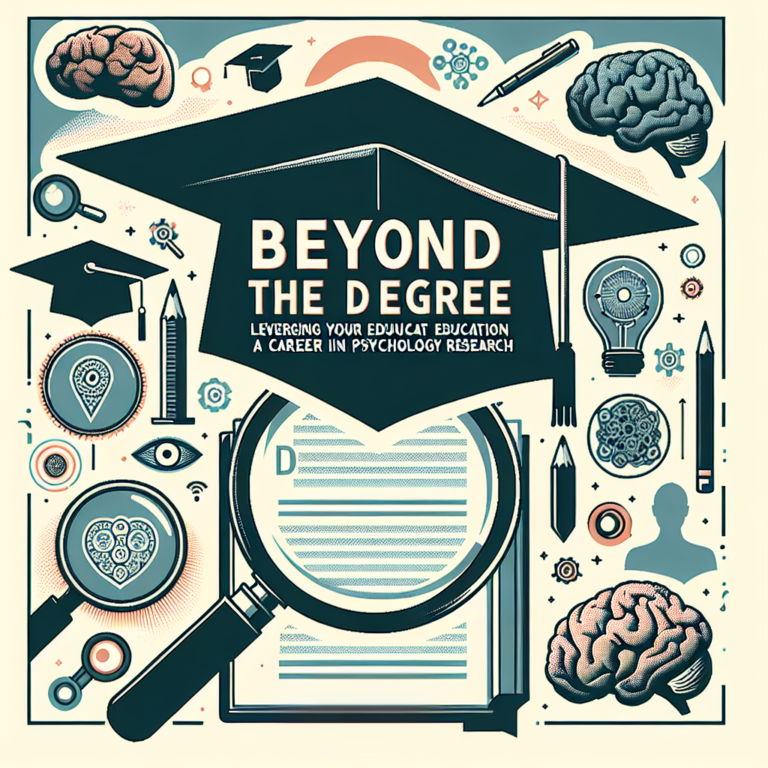
Introduction
In today’s fast-paced world, the conversation around mental health has reached an unprecedented crescendo. With one in five adults experiencing mental illness at some point in their lives, the need for trained mental health professionals has never been greater. The Rising Demand for Mental Health Professionals: Why a Master’s in Psychology is Your Next Step offers critical insights into this burgeoning field, offering compelling reasons to consider a master’s degree in psychology as both a career move and a way to make a meaningful difference in society.
The Mental Health Landscape: A Growing Concern
The COVID-19 pandemic has spotlighted mental health, revealing longstanding issues while adding new layers of complexity. Anxiety, depression, and substance abuse have surged, leading many to seek help. According to a recent study by the National Institute of Mental Health (NIMH), a staggering 41.5% of adults reported symptoms of anxiety or depressive disorder in January 2021, compared to 11% in 2019.
| Year | Percentage Reporting Anxiety/Depression |
|---|---|
| 2019 | 11% |
| 2020 | 32% |
| 2021 | 41.5% |
Such numbers spotlight the urgent need for mental health professionals, situating psychology as a crucial field for both personal fulfillment and societal betterment.
The Current Need for Mental Health Professionals
Unpacking the Demand
The statistics paint a clear picture: the demand for mental health services is soaring. As governments and health organizations prioritize mental well-being, the provision of mental health support has become integral to healthcare systems. According to the Bureau of Labor Statistics, employment for psychologists is projected to grow 3% from 2020 to 2030, which aligns with the trend towards integrating mental health care into primary health systems.
Case Study: Integrating Mental Health in Schools
A notable example comes from the state of California, where school districts have ramped up hiring to tackle mental health crises among students. After implementing school-based mental health programs, one district reported a 25% increase in students seeking services. This trend underscores the critical role psychologists play in educational settings, enhancing the case for pursuing advanced degrees in psychology.
Why a Master’s in Psychology?
Comprehensive Skill Set
A master’s in psychology equips students with essential skills in research, assessment, and clinical practice. Coursework typically covers subjects such as developmental psychology, behavioral therapy, and ethical issues in mental health. Graduates emerge not only with strong theoretical knowledge but also practical skills to address real-world problems.
Career Opportunities Galore
Holding a master’s in psychology opens doors to various career paths. Here are just a few options:
- Clinical Psychologist: Working in hospitals or private settings, clinical psychologists diagnose and treat mental illnesses.
- Counselor: School or community counselors help individuals manage life challenges.
- Industrial-Organizational Psychologist: Focused on workplace behavior, these psychologists improve employee performance and morale.
Financial Incentives
Financially, the investment in a master’s degree often pays off handsomely. According to PayScale, those holding a master’s in psychology can expect to earn 20-50% more annually than those with only a bachelor’s. Here’s a breakdown:
| Degree Level | Average Salary |
|---|---|
| Bachelor’s in Psychology | $45,000 |
| Master’s in Psychology | $60,000 – $70,000 |
This financial uptick, along with the fulfillment that comes from helping others, makes pursuing a master’s degree appealing.
The Unique Benefits of a Master’s Program
Networking Opportunities
Graduate programs often offer rich networking opportunities. Students connect with peers, professors, and industry professionals who can provide insights and lead to internship or job opportunities.
Experienced Faculty
Often, master’s programs in psychology feature faculty who are active practitioners in the field. Engaging with these professionals offers students invaluable real-world perspectives and insights.
Diverse Specializations
The realm of psychology is vast, and many master’s programs allow students to specialize in areas such as forensic psychology, neuropsychology, or child development, tailoring their education to their personal passions and career aspirations.
Overcoming Common Misconceptions
"I Can’t Afford It"
Financing education can be a hurdle; however, numerous scholarships, grants, and assistantships can significantly reduce costs. Understanding options beyond student loans is crucial for prospective students.
"It’s Too Intense"
While pursuing a master’s in psychology can be demanding, many find that the rewarding nature of the work provides ample motivation. Time management and self-care strategies can make the academic load more manageable.
Actionable Insights: Steps Toward Your Degree
- Research Programs: Look for accredited universities that offer a master’s in psychology that aligns with your interests and career goals.
- Connect with Alumni: Speaking to graduates can provide insights into program strengths and job prospects post-graduation.
- Prepare for Exams: Standardized tests (GRE) may be a requirement for many programs; ensure you allocate time for study and preparation.
Conclusion
The growing urgency surrounding mental health has created a unique and profound opportunity for those interested in pursuing a career in psychology. The Rising Demand for Mental Health Professionals: Why a Master’s in Psychology is Your Next Step outlines not only the necessity but also the profound impact that mental health professionals can have on individuals and communities.
As you consider your next steps, envision a future where you are at the forefront of mental health care, armed with the skills and knowledge to make a meaningful difference. Pursuing a master’s degree in psychology could be one of the most rewarding decisions you’ll ever make, both for your career and for those you aim to serve.
FAQs
1. Is a master’s in psychology required to work in the field?
While some entry-level positions are available with a bachelor’s degree, most roles, especially in clinical settings, require a master’s or higher.
2. What are the differences between a master’s in psychology and a master’s in counseling?
A master’s in psychology generally focuses on research and theory, while a master’s in counseling emphasizes clinical practice and therapeutic techniques.
3. How long does it typically take to complete a master’s in psychology?
Most programs can be completed in 2-3 years of full-time study.
4. What licensure is required after obtaining a master’s in psychology?
Requirements vary by state, but most require post-graduate supervised experience and passing a licensing exam.
5. Can I specialize while pursuing a master’s degree in psychology?
Absolutely! Many programs offer specializations or electives in areas such as health psychology, forensic psychology, or child psychology.
In a world that increasingly acknowledges the significance of mental health, positioning yourself with a master’s in psychology could be your path toward not just a rewarding career but also a chance to change lives. The demand is rising; will you answer the call?

















